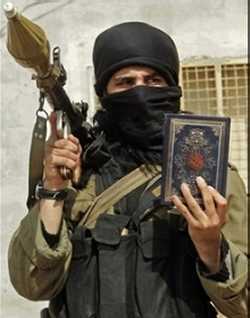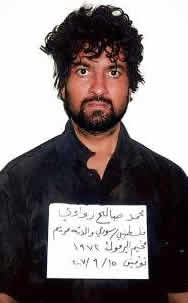 Fatah al-Islam's spokesman Abu Salim Taha named the perpetrators of the Feb. 13 twin bus bombings in Ain Alaq north of Beirut that left three people killed and 23 others wounded.
Fatah al-Islam's spokesman Abu Salim Taha named the perpetrators of the Feb. 13 twin bus bombings in Ain Alaq north of Beirut that left three people killed and 23 others wounded.Abu Taha identified the executors as Abu Omar al-Hijji, a Syrian who was killed at the beginning of the Nahr al-Bared fighting, and Mustafa Siyor, also a Syrian who is in police custody.
The daily As Safir, which carried the report, said the Lebanese army's intelligence bureau was capable of "drawing a complete pyramid" of the al-Qaida-inspired Fatah al-Islam terrorist group. Citing unnamed sources, the paper said Abu Taha presented "all the facts" related to bank robberies designed for financing his group. After 50 days of investigation, Abu Taha also named Fatah al-Islam's financial coordinator as Abu Ritaj, possibly a Saudi, whose lineage goes back to al-Qaida.
Taha presented a list of Fatah al-Islam names who are largely Syrian. The report said 70 Fatah al-Islam members are Syrian, 50 Saudis, another 50 of various Arab nationalities, in addition to about 20 Palestinians, 10 Jordanians and others from Afghan, Chechnya and Serbia.
Bomb blasts tore through two buses in Lebanon on February 13, 2007, killing three people and injuring 23 in the Metn region east of Beirut, as the deeply divided nation prepared to commemorate Hariri's murder two years ago. The blasts, which occurred minutes apart, tore through two buses traveling on a busy commuter road. A higher death toll was averted because passengers from the second bus had rushed out to help the victims of the first explosion.
On March 14, 2007, four Syrians held by the Lebanese authorities confessed to bombing the two buses. Security officials said that the ring leader of the plot was a Syrian, Mustafa Sayour, who had confessed to planting the bombs.

 Yesterday the Lebanese army and the Lebanese security forces were able to arrest the fugitive spokesman of Fatah al-Islam , a terrorist organization that was based in the Nahr el Bared Palestinian refugee camp. The army today released his picture and some details about him.
Yesterday the Lebanese army and the Lebanese security forces were able to arrest the fugitive spokesman of Fatah al-Islam , a terrorist organization that was based in the Nahr el Bared Palestinian refugee camp. The army today released his picture and some details about him. The first round of DNA tests conducted on Fatah al-Islam's terrorist mastermind Shaker Absi did not match him, media reports said. The report on OTV came as a surprise to the Palestinian Scholars Association (PSA).
The first round of DNA tests conducted on Fatah al-Islam's terrorist mastermind Shaker Absi did not match him, media reports said. The report on OTV came as a surprise to the Palestinian Scholars Association (PSA). NAHR Al BARED, Lebanon - Lebanese soldiers hunted down fugitive militants on Monday after crushing an Islamist group in fighting that ended a deadly 15-week standoff at a battered Palestinian refugee camp. As troops swept the devastated shantytown in northern Lebanon for explosives and hunted for any surviving members of Fatah Al Islam, the bodies of two of the Sunni extremist groups leaders were identified, an army spokesman said.
NAHR Al BARED, Lebanon - Lebanese soldiers hunted down fugitive militants on Monday after crushing an Islamist group in fighting that ended a deadly 15-week standoff at a battered Palestinian refugee camp. As troops swept the devastated shantytown in northern Lebanon for explosives and hunted for any surviving members of Fatah Al Islam, the bodies of two of the Sunni extremist groups leaders were identified, an army spokesman said. We have identified the bodies of Fatah Al Islam chief
We have identified the bodies of Fatah Al Islam chief 